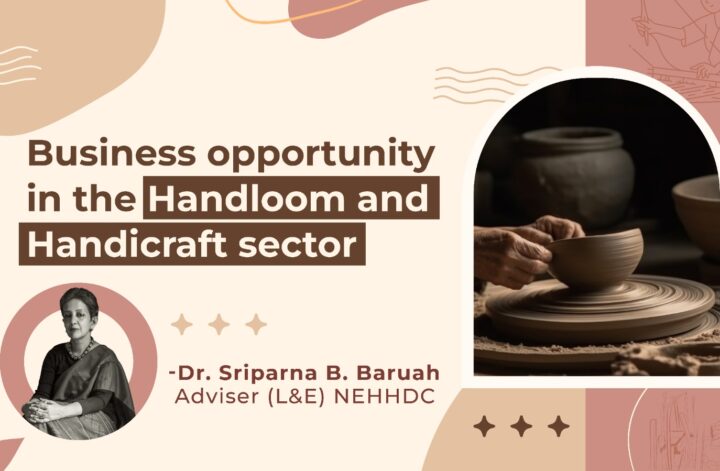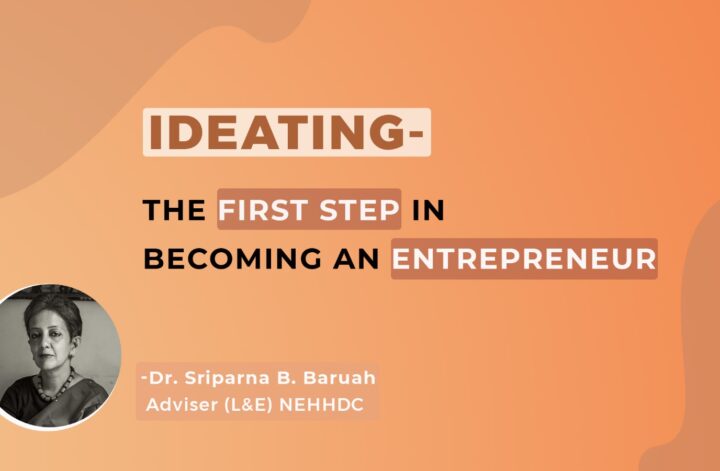North East India is home to unique variety of silk including Muga, Eri, Mulberry and Tussar. Silk production in North East India accounts for 22.86% of the total silk production in India. Muga silk or golden silk of Assam is GI tagged and is produced only in this region.
With the unique handloom patterns and handicraft techniques, there is huge potential to cater to a wide range of markets with distinct offerings. With the abundance of agro-horticultural and forest resources, there is ready availability of materials like bamboo, cane and natural dyes, thus paving the way for eco-friendly and sustainable craft production. This also aligns with the global demand for green products. There is also scope to harness banana fibre and pineapple leaf fibre for textiles.
By promotiong regional crafts, supporting independent creators and by using environmentally responsible materials, a small business in this sector has a lot of opportunity and can also help in improving social and environmental issues.
Sharing some profitable business ideas in this sector
Handloom weaving
Marketing of handloom products is one of the most common business idea. By connecting with local artisans,one can sell handloom products online or offline through exibitions, fairs or boutiques.
Handicrafts making
Handicrafts making is another traditional and lucrative textile business idea in India that involves creating decorative or functional items using various materials like fabric, thread, beads etc. Handicrafts making can include activities like embroidery, crochet, knitting, quilting, patchwork, applique etc.
Handicraft making enables expression of creativity and individuality while producing attractive and useful products that have a high demand among customers who appreciate handmade goods.
Garment manufacturing:
Garment manufacturing is one of the most profitable and scalable textile business ideas in India, as the country has a huge domestic market as well as a strong export potential for clothing. One can start a garment manufacturing business by choosing a niche or product category that suits the skill set and market demand, such as ethnic wear, western wear, kids wear, sportswear etc.
Accessories making:
Accessories making is the process of creating items that complement or enhance the appearance of clothing, such as bags, belts, scarves, hats etc. One can start an accessories making business by choosing a type of accessory that matches one’s style and skill level, such as leather bags, fabric belts, silk scarves etc.
Home furnishings making:
Home furnishings making is the process of creating items that enhance the comfort and beauty of a home, such as curtains, cushions, bed sheets, table cloths etc. Home furnishings making is a profitable and growing textile business idea in India that can help to tap into the rising demand for home decor products among urban and rural consumers.
Fabric printing:
Fabric printing is the process of applying colours or patterns to fabrics using various methods such as block printing, screen printing, digital printing etc. Fabric printing is an innovative and versatile textile business idea that can help you create unique and customized fabrics for various purposes such as clothing, accessories, home furnishings etc.
Fabric dyeing:
Fabric dyeing is the process of changing the colour of fabrics using various chemicals or natural substances such as indigo, turmeric, henna etc. Fabric dyeing is an eco-friendly and artistic textile business idea in India that can help you create beautiful and vibrant fabrics for various purposes such as clothing, accessories, home furnishings etc.
Textile recycling:
Textile recycling is the process of converting waste textiles into new products such as yarns, fabrics, clothing etc. Textile recycling is a sustainable and profitable textile business idea in India that can help in reducing environmental pollution and save resources while generating income.
Textile designing:
Textile designing is the process of creating designs for textiles using various tools such as software, sketches, samples etc. Textile designing is a creative and lucrative textile business idea in India that can help in showcasing one’s talent and vision while producing attractive and functional textiles for various purposes such as clothing, accessories, home furnishings etc.
Textile consultancy:
Textile consultancy is the process of providing expert advice and guidance to textile businesses or individuals on various aspects such as product development, quality control, marketing, branding, etc. Textile consultancy is a professional and rewarding textile business idea in India that can help in leveraging one’s knowledge and experience while helping others achieve their goals and solve their problems.
The handloom sector offers promising business opportunities. Here are some key points to consider:
Rising Demand for Sustainable Fashion: As consumers become more conscious of the environmental impact of fast fashion, there’s a growing demand for sustainable and ethically produced textile. Handloom products, often made from natural fibers and dyes, fit well into this trend.
E-commerce and Online Platforms: Lockdowns and increased online engagement have drawn attention to the handloom industry. E-commerce and social media platforms allow handloom artisans to showcase their unique products to a global audience.
Cultural Significance and Heritage: Handloom products hold cultural value in many regions, reflecting heritage and identity. As globalization blurs cultural boundaries, people seek products that preserve and celebrate their roots, further fuelling demand.
Eco-Friendly Alternatives: Handloom textiles are eco-friendly alternatives to mass-produced fabrics. As environmental concerns intensify, more consumers are turning toward handloom products, reducing the carbon footprint.
It is important to remember that the handloom business is diverse, offering various roles from loom operators to fabric designers. If one is considering entering this industry, it is important to explore these opportunities and find one’s own niche

